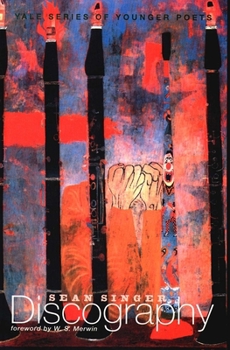Book Overview
This year's winner of the Yale Series of Younger Poets competition is Sean Singer's Discography . Playful, experimental, jazz-influenced, the poems in this book delight in sound and approach the more abstract pleasures of music. Singer takes as his subjects music, jazz figures, and historical events. Series judge W. S. Merwin praises Singer for his "roving demands on his language" and "the quick-changes of his invention in search of some provisional...
Format:Paperback
Language:English
ISBN:0300093632
ISBN13:9780300093636
Release Date:November 2002
Publisher:Yale University Press
Length:96 Pages
Weight:0.30 lbs.
Dimensions:0.3" x 6.0" x 9.4"
Related Subjects
PoetryCustomer Reviews
4 ratings
A Delightful First Book
Published by Thriftbooks.com User , 19 years ago
The biographical nature of Sean Singer's "Discography" contains a delightful array of poems about musicians. As an unbelievable first book, "Discography" was selected winner of the "2001 Yale series of Younger Poets". Its jazz-centered poems are enjoyable to, not only jazz fans but, music fans as a whole. This being Singer's first book, it is not as advanced in style as those books written by poets such as Paul Muldoon or Robert Pinsky. Many first time poets have this same problem, but like a singer, a poet "has to grow into his voice"! Sean Singer is one of few younger poets whose work is understandable and acceptable by just about anyone. Singer's poems tend to grasp the reader, keeping them on edge by not unveiling the direct meaning of the poem, letting the reader figure it out on their own. After reading Signer's poems in Discography several times, they tend to "shine brighter"! You grasp a greater meaning every time you read it, providing you with more understanding. Sean Singer's poems are very much enjoyable even if you don't fully comprehend. He even adds some unique styles in Discography such as the "chopping up" of sentences along the page in "The Old Record". Singer is only in his 20's and has only written one book, but one can only imagine how his talent will grow and what he will write in the future.
something else
Published by Thriftbooks.com User , 21 years ago
sean singer displays an astonishing energy and range in this collection, and (this is one of the signs of good art) the poems seem to improve with each rereading. a lot of the poems seem difficult at first, but the pleasure of reading them is always there, and sometimes -- i'm thinking of "Ellingtonia" and others -- the not-understanding almost adds to the pleasure, like listening to a song for the first time which you know is pretty damn good even though you can only understand a few of the words. but singer isn't being willfully obscure -- when you read them again, you start to see that he is sort of inventing a language of his own with each poem, which -- let's face it -- is what most great poets do. other poems, too, are just plain fun, like "The Old Record," the opening poem, wild and almost cummings-esque in the way the words spin around the page, but cummings never wrote anything quite like it either. others need no explanation, like "The Tiger Interior" or "But Beautiful".anyway, reading this book excited me and excites me still. sean singer isn't even thirty, and he's already writing like this -- complicated, intelligent, with a voice he can call his own. imagine the future.
No denying skill, but still freeze-dried
Published by Thriftbooks.com User , 21 years ago
It says a lot about contemporary poetry when a prize-winning collection's frame of reference is 40s and 50's jazz music -- a form not popular since, well, the 1950s. The Singer book skillfully drops all the requisite jazzbo references, which must make people like W.S. Merwin, the Yale Series judge, ache for his youth or at least feel hep for the hour. But how long can poetry crutch on such shop-worn referentiality? Certainly not long enough to earn poetry a general and appreciative audience. My quibble here isn't with the skill -- that's all there. It reminds me of the question the late poet William Matthews, also a jazz fan, once posed to a lecture audience: "What did posterity do for us lately?" In the case of this book, not much, I'm afraid. Just seems freeze-dried.
Words as Music
Published by Thriftbooks.com User , 22 years ago
Moving between himself in the third person and others in the first, Singer interpolates the line that wavers between degradation and redemption and is itself art. His poems are like fragments of jazz crystallized out of music and into language. The whole that emerges from these fragments is more than just a literary analog of jazz; it embraces the history and power of the movement to enact change, the ability of art to transform. This book succeeds at the impossible project of showing us ourselves as individuals while revealing the sameness that holds us together.





